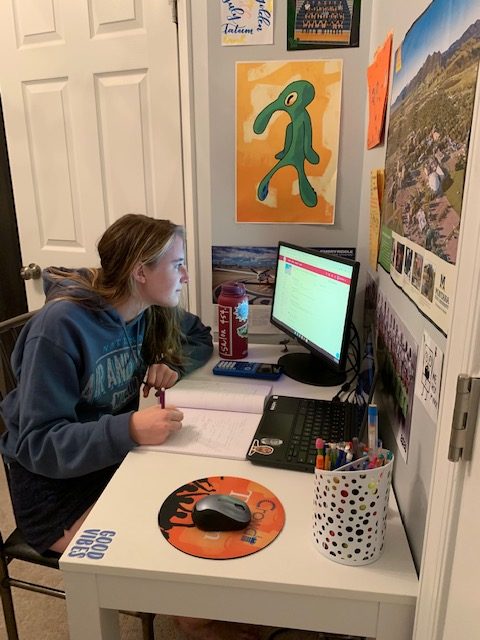Loudoun County Public Schools Navigates Distance Learning for the 2020-21 School Year
Junior Tatum Black using the new platform Schoology for her homework.
October 29, 2020
Loudoun County Public School’s staff and students have been learning virtually since March of 2020, which results in long hours of sitting at your computer. This includes participating in live synchronous learning, completing asynchronous work, and communicating with teachers and peers virtually, which all take a toll on the body and mind. Students and staff must search for ways to stay attentive and motivated throughout the day, while also adapting to the constant new changes this school year.
One of the changes the county has made this year is transitioning from Google Classroom to Schoology; both platforms manage school assignments and assessments. This platform change has caused LCPS students and staff to have to navigate a new program while they are also tackling the adaptation to distance learning.
The transition to Schoology has proved to be more troublesome than originally anticipated. Sophomore Kevin Beach says, “It’s so confusing; so many teachers keep having technology issues, which takes up class time and makes it harder for students to get work done. I wish that they had stayed with Google Classroom, and I know a lot of my friends agree.”
Many students and parents were left questioning why the LCPS school board decided to change programs during a time that is already unprecedented to begin with. “The switch from Google Classroom to Schoology had been planned for years,” says school board member Ian Serotkin. “The major benefits of Schoology compared to Google Classroom include family access, enhanced assessment capabilities, advanced analytics and reporting, and division-wide content sharing and collaboration features.”
Another adjustment for students and staff was shifting to an AABB class schedule rather than the regular ABAB. Instead of having classes that alternate each day, students and teachers now face two consecutive days of the same blocks.
With the AABB schedule, students and staff will not see each other for up to six days, which can make it difficult for students to effectively retain information. “I have a hard time with the AABB schedule since I don’t see my students for a week at a time. That being said, it’s nice to see them two days in a row,” says history teacher Kate Corrado.
During the recent school board meeting on October 13th, it was decided that the schedule would switch to the previous ABAB, beginning in November. This will allow teachers and students to see each other in five days rather than the six under the AABB schedule.
Throughout all of distance learning, sitting and staying on a computer for extended periods of time is the new normal.
“Mentally, I feel it is much harder to stay focused and just to have the motivation to learn and get the work done, and I feel like it’s much more fast-paced. Physically, it’s very exhausting too because you’re sitting there all day in front of a computer, so it’s really draining,” says senior Amber Dubey.
This doesn’t just affect students, as teachers are feeling mentally strained too. Principal of Woodgrove High School Sam Shipp recognizes the widespread issue by saying, “We tried to find a balance as to recognizing that there’s a lot of information coming to teachers from a number of different directions. We’ve really tried to make it reasonable knowing that we’re not going to be able to remove all stress because this is new, but where we can, we’ve tried to minimize a number of things and just focus on the core of what our mission is.”
One resource that Woodgrove High School has implemented this school year is the Counseling Department’s online virtual calming room. Provided for teachers and students, the calming room includes links for various ways to take care of themselves such as exercise, coloring and creativity, healthy cooking, and more.
LCPS has made it clear since the beginning of the school year that the overall well-being of its community is the number one priority. They are constantly working to ensure that its teachers and students are in the best position to tackle the school year. “There’s more that we can and should do, though, to make sure that we’re taking care of our teachers and our students through this difficult time,” says Serotkin.



